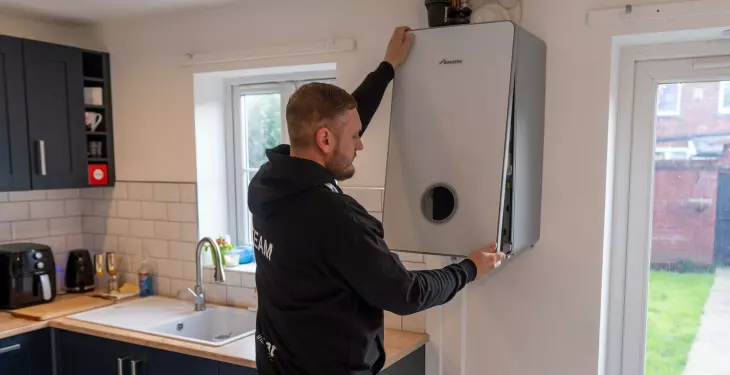

Written by Stephen Day
Gas Safe Engineer
Updated: 7th November, 2025
Most boiler installations take between one and two days depending on your current setup and boiler type.
Get a new boiler quote, save up to £550 per year (0% APR available).
Whether you’re replacing an old boiler or upgrading to a combi, this guide explains exactly how long it takes to fit a new boiler in a UK home.
For most homes, a new boiler can be installed in a single day. A straightforward like-for-like combi swap usually takes around six hours, while fitting a new boiler to an old system can take longer due to additional pipework and component changes.
If your system needs upgrading, pipework changes, or relocation, the job can extend to two days or more.
Quick guide to installation times:
Boiler Type | Typical Timeframe | Notes |
Combi to combi swap | 1 day | Same location, minimal pipework |
System to combi conversion | 1-2 days | Hot water cylinder removed and new pipework fitted |
Regular boiler replacement | 1-2 days | May include flue or control upgrades |
Relocation or back boiler | 2-3 days | More complex pipework and testing needed |
Knowing how long a boiler installation takes helps you plan around heating and hot water downtime.
A proper installation includes testing, safety checks and flushing, which take time but ensure efficiency and reliability. Cutting corners can cause future faults or safety issues.
Combi boilers are the fastest to install. If you already have a combi boiler, the existing pipework is often suitable.
After removing the old boiler, the engineer mounts the new one, connects gas and water lines, and tests for leaks.
Once fitted, the system is filled, radiators are bled and the boiler is commissioned for use.
A system-to-combi conversion takes longer because the hot water cylinder must be removed and the pipework reconfigured.
The engineer will make sure the controls and electrics are compatible and that the system meets current Building Regulations.
Replacing a regular or conventional boiler usually takes up to two days because the system includes tanks and vented pipework.
The engineer may also upgrade flues, pumps or controls to meet modern standards.
Back boilers are built into chimneys and require more labour to remove.
Relocating a boiler also adds time as it involves rerouting gas, water and flue pipes, drilling new wall outlets and reconnecting electrics.
A simple combi swap is straightforward, while converting from another system type takes longer because more components need removing or rerouting.
Moving the boiler to a new area such as a loft or airing cupboard increases installation time. The engineer must extend pipework, install a new flue outlet and ensure proper drainage for the condensate pipe.
Older homes may have corroded pipes or poor water pressure. Replacing old pipework or flushing out sludge adds extra hours to the job.
A new boiler may need a larger gas supply or modernised wiring to comply with safety standards. Adding new thermostats or smart controls can also extend the time slightly.
Once installation is complete, the engineer will test for leaks, check combustion readings and ensure everything runs efficiently. This is an essential part of the process and takes several hours to complete properly.
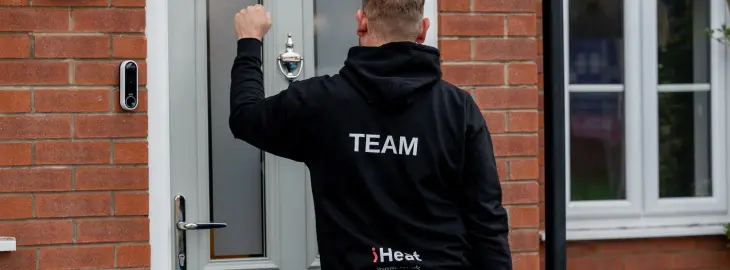
Your Gas Safe engineer will confirm credentials, inspect the current setup and isolate the gas, water and electricity before starting work.
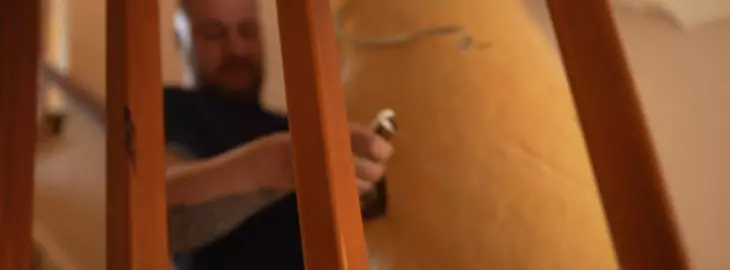
The old boiler, flue and any unnecessary components are safely removed. The wall is prepared for the new unit and cleaned of debris or old fixings.
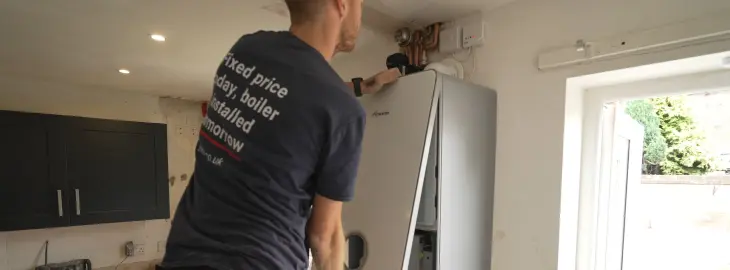
The new boiler is mounted, pipework is connected and additional parts such as filters and thermostats are installed. Proper fitting ensures efficiency and quiet operation.
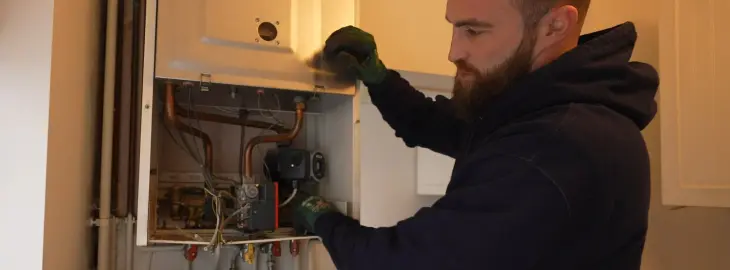
The system is filled with water and checked for leaks. The engineer performs a chemical or power flush to remove sludge and ensure clear circulation.
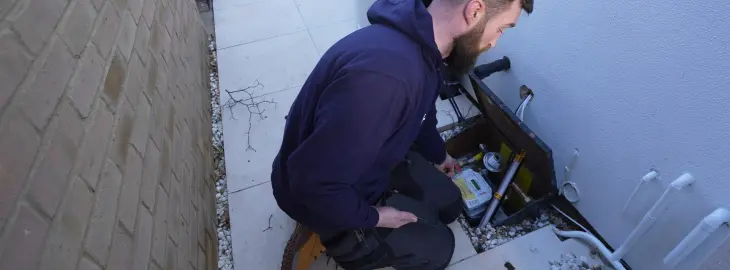
The engineer tests the boiler under pressure, checks emissions and records gas readings. They will then show you how to use the controls and register your manufacturer’s warranty.
Move furniture or stored items that block the area around the boiler, gas meter or flue exit. Clear access saves time on installation day.
Check that all utilities are working before the engineer arrives. This avoids delays once work begins.
If you plan to add thermostats, move pipework or upgrade controls, let the installer know before the day. This ensures accurate timing and pricing.
Old or hidden pipework can reveal corrosion or leaks that need fixing before installation can continue.
Sometimes a specific flue, control unit or valve must be ordered from the manufacturer, adding a short delay.
If gas readings or flue tests fail the first time, your engineer will make corrections before sign-off. This ensures the boiler runs safely and efficiently.
You can get a fixed price quote online in seconds.
All installations are carried out by fully qualified Gas Safe engineers with transparent pricing and local availability.
In many areas, new boilers can be installed as soon as the next working day after booking.
Book annual servicing - Have your boiler serviced every 12 months by a Gas Safe engineer to maintain efficiency and keep the warranty valid.
Keep system water clean - Ask your installer about filters and corrosion inhibitors. They protect internal parts and prevent future blockages.
Check pressure monthly - Boiler pressure should stay between 1 and 1.5 bar when cold. Top up as needed following your manual.
Look out for early warning signs - Cold spots, dripping valves or unusual noises can signal trapped air or early leaks. Acting quickly prevents damage.
A new boiler installation usually takes between one and two days. A simple combi replacement can be completed in a day, while conversions or relocations take longer.
Several factors affect installation time including system layout, boiler type, and whether old pipework needs replacing.
Always choose a Gas Safe engineer to ensure the job meets safety standards and runs efficiently.
With clear preparation, good access and annual maintenance, your new boiler will deliver reliable heating and hot water for years to come.
Yes, fitting a new boiler can be messy, especially if pipework adjustments are necessary. However, professional installers will work to minimise the mess and clean up afterward.
Last updated: 7th November, 2025

Written by Stephen Day
Gas Safe Engineer at iHeat
Stephen Day is a Gas Safe registered and FGAS certified engineer with over 20 years of hands-on experience in the heating, cooling, and renewable energy industry, specialising in boiler installations, air conditioning, and heat pump systems.
LinkedInArticles by Stephen Day are reviewed by iHeat’s technical team to ensure accuracy and reliability.

19th February, 2026
Selecting the appropriate boiler for your London home involves understanding the different...
 Read Article
Read Article

19th February, 2026
A typical Annual Boiler Service includes a visual inspection to identify any obvious fault...
 Read Article
Read Article

19th February, 2026
Boiler servicing comprises a set of inspections and tests conducted by a qualified enginee...
 Read Article
Read Article
No obligation. Takes less than 60 seconds.